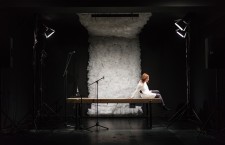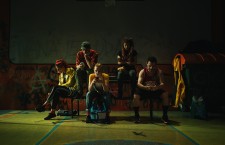GETTING ALONG WITH
People rarely hug here when meeting in the street, rarely squeeze each other wholeheartedly. Why hug when they see each other all the time. Nothing new happens for months and for years. Someone dies now and then, someone is born, moves in, while only those who can or have to move out. I don’t know whether it means that no one misses anyone here, that people here suffer from the lack of yearning, I have no idea, perhaps there are those who yearn for someone or something, there are probably such people too, it would be totally insane if there were not such a person.
Daša Drndić
A few months ago, The Croatian Drama ensemble met Anne Bogart, one of the greatest American directors. During our meeting, Anne pronounced a sentence, namely, a definition of theatrical art that all of us, both artists and spectators can use as a reminder of why we create and consume theatre: The theatre is about how we get along with each other.
The 2018/2019 season introduces us to the programme of the European Capital of Culture, the outcome of which depends on the way we will be getting along with each other and how, based on that, we will uphold what we believe the subject matter of public interest to be. Clearly, this is not only the issue regarding the European Capital of Culture project, but also a much larger problem of social polarisation that is growing on the economic abyss. Thus the role of the Croatian Drama 2018/19 season will be an attempt to understand better our emotional and intellectual cooperation; reasons due to which we feel we belong or do not so to a community, the ability to improve it, break or leave it.
The first title of the season is Michelangelo, after the play by Krleža and in the direction of the Slovenian director Sebastijan Horvat, who, three years ago, by his staging of the Croatian Rhapsody prompted a dynamic debate on how we communicate with Krleža’s works nowadays, a staging so dynamic that its name had to be changed into On the Grave of Stupid Europe / Nad grobom glupe Europe. The interest of Horvat for the idea of a genius or a kind of a Nietzsche’s superhuman being (Ubermensch) is this time directed to the power of artistic creation that is becoming dissolved in the contact with the everyday social and political picture.
Regoč by Ivana Brlić Mažuranić, in the direction of Olja Lozica, was chosen as the second premiere of the season as we wish to show that those willing to give a helping hand to each other deserve the best of the world, while vanity and envy make bridges collapse, flood people, villages, towns and civilisations. Regoč and Kosjenka, Ljiljo, Old man and Old woman are torchbearers of our youngest visitors – one day adult neighbours and fellow citizens.
Leica format by Daša Drndić, the third premiere in this season, is the most painful one with regard to our local context. Not only because Daša has not been with us since recently, but also because Leica format is pulling out the roots of the badly healed wounds of our past and present; the past of poorhouses, orphanages, psychiatric institutions, fascism and the unusual identity of the city that according to her “is rotting silently and invisibly, from the inside”. Leica format will be our opportunity for dismantling the local patriotism, as well as a challenge for the European Capital of Culture slogan Port of Diversity.
The Croatian Drama premieres also comprise joint productions of artistic branches as the Theatre Enchantment / Kazališna čarolija and Sunset Boulevard / Bulevar Sumraka.
In short, it is beyond doubt that in the 2018/19 season we are going to find out how we are getting along with each other.
Renata Carola Gatica, Croatian Drama director
and
Nataša Antulov, Croatian Drama dramaturge













